堆栈源码
Vector:
public class Vector<E> extends AbstractList<E> implements List<E>, RandomAccess, Cloneable, java.io.Serializable { /** * The array buffer into which the components of the vector are * stored. The capacity of the vector is the length of this array buffer, * and is at least large enough to contain all the vector's elements. * * <p>Any array elements following the last element in the Vector are null. * * @serial */ protected Object[] elementData; /** * The number of valid components in this {@code Vector} object. * Components {@code elementData[0]} through * {@code elementData[elementCount-1]} are the actual items. * * @serial */ protected int elementCount; /** * The amount by which the capacity of the vector is automatically * incremented when its size becomes greater than its capacity. If * the capacity increment is less than or equal to zero, the capacity * of the vector is doubled each time it needs to grow. * * @serial */ protected int capacityIncrement; /** use serialVersionUID from JDK 1.0.2 for interoperability */ private static final long serialVersionUID = -2767605614048989439L; /** * Constructs an empty vector with the specified initial capacity and * capacity increment. * * @param initialCapacity the initial capacity of the vector * @param capacityIncrement the amount by which the capacity is * increased when the vector overflows * @throws IllegalArgumentException if the specified initial capacity * is negative */ public Vector(int initialCapacity, int capacityIncrement) { super(); if (initialCapacity < 0) throw new IllegalArgumentException("Illegal Capacity: "+ initialCapacity); this.elementData = new Object[initialCapacity]; this.capacityIncrement = capacityIncrement; } /** * Constructs an empty vector with the specified initial capacity and * with its capacity increment equal to zero. * * @param initialCapacity the initial capacity of the vector * @throws IllegalArgumentException if the specified initial capacity * is negative */ public Vector(int initialCapacity) { this(initialCapacity, 0); } /** * Constructs an empty vector so that its internal data array * has size {@code 10} and its standard capacity increment is * zero. */ public Vector() { this(10); } /** * Constructs a vector containing the elements of the specified * collection, in the order they are returned by the collection's * iterator. * * @param c the collection whose elements are to be placed into this * vector * @throws NullPointerException if the specified collection is null * @since 1.2 */ public Vector(Collection<? extends E> c) { elementData = c.toArray(); elementCount = elementData.length; // c.toArray might (incorrectly) not return Object[] (see 6260652) if (elementData.getClass() != Object[].class) elementData = Arrays.copyOf(elementData, elementCount, Object[].class); } /** * Adds the specified component to the end of this vector, * increasing its size by one. The capacity of this vector is * increased if its size becomes greater than its capacity. * * <p>This method is identical in functionality to the * {@link #add(Object) add(E)} * method (which is part of the {@link List} interface). * * @param obj the component to be added */ public synchronized void addElement(E obj) { modCount++; ensureCapacityHelper(elementCount + 1); elementData[elementCount++] = obj; } /** * This implements the unsynchronized semantics of ensureCapacity. * Synchronized methods in this class can internally call this * method for ensuring capacity without incurring the cost of an * extra synchronization. * * @see #ensureCapacity(int) */ private void ensureCapacityHelper(int minCapacity) { // overflow-conscious code if (minCapacity - elementData.length > 0) grow(minCapacity); } /** * The maximum size of array to allocate. * Some VMs reserve some header words in an array. * Attempts to allocate larger arrays may result in * OutOfMemoryError: Requested array size exceeds VM limit */ private static final int MAX_ARRAY_SIZE = Integer.MAX_VALUE - 8; private void grow(int minCapacity) { // overflow-conscious code int oldCapacity = elementData.length; int newCapacity = oldCapacity + ((capacityIncrement > 0) ? capacityIncrement : oldCapacity); if (newCapacity - minCapacity < 0) newCapacity = minCapacity; if (newCapacity - MAX_ARRAY_SIZE > 0) newCapacity = hugeCapacity(minCapacity); elementData = Arrays.copyOf(elementData, newCapacity); }
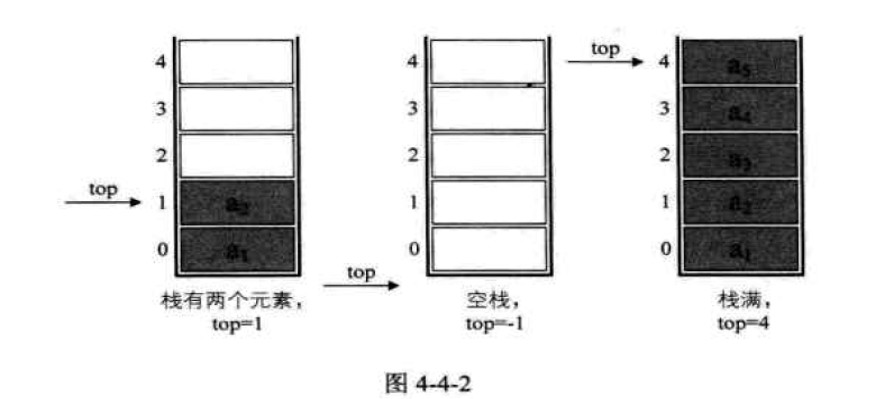
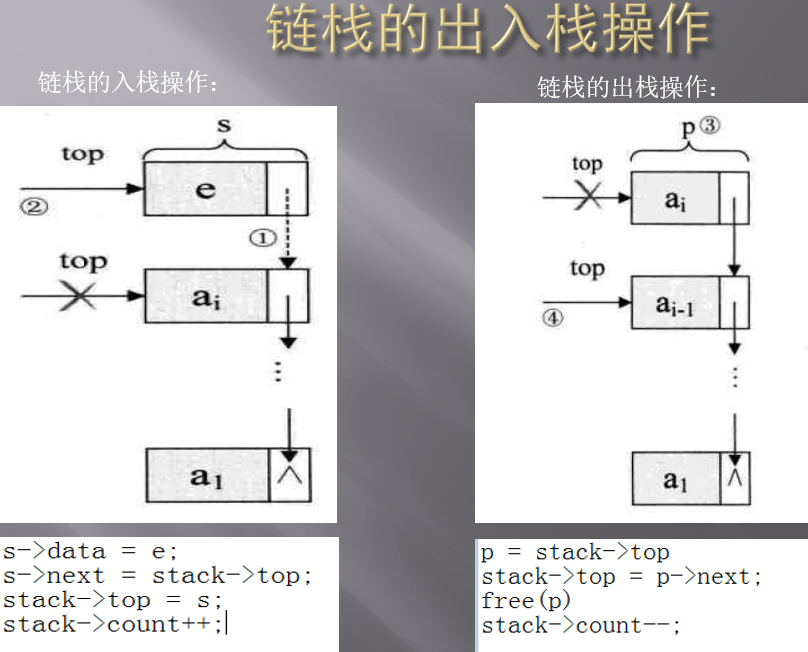
Stack:
public class Stack<E> extends Vector<E> { /** * Creates an empty Stack. */ public Stack() { } /** * Pushes an item onto the top of this stack. This has exactly * the same effect as: * <blockquote><pre> * addElement(item)</pre></blockquote> * * @param item the item to be pushed onto this stack. * @return the <code>item</code> argument. * @see java.util.Vector#addElement */ public E push(E item) { addElement(item); return item; } /** * Removes the object at the top of this stack and returns that * object as the value of this function. * * @return The object at the top of this stack (the last item * of the <tt>Vector</tt> object). * @throws EmptyStackException if this stack is empty. */ public synchronized E pop() { E obj; int len = size(); obj = peek(); removeElementAt(len - 1); return obj; } /** * Looks at the object at the top of this stack without removing it * from the stack. * * @return the object at the top of this stack (the last item * of the <tt>Vector</tt> object). * @throws EmptyStackException if this stack is empty. */ public synchronized E peek() { int len = size(); if (len == 0) throw new EmptyStackException(); return elementAt(len - 1); } /** * Tests if this stack is empty. * * @return <code>true</code> if and only if this stack contains * no items; <code>false</code> otherwise. */ public boolean empty() { return size() == 0; }
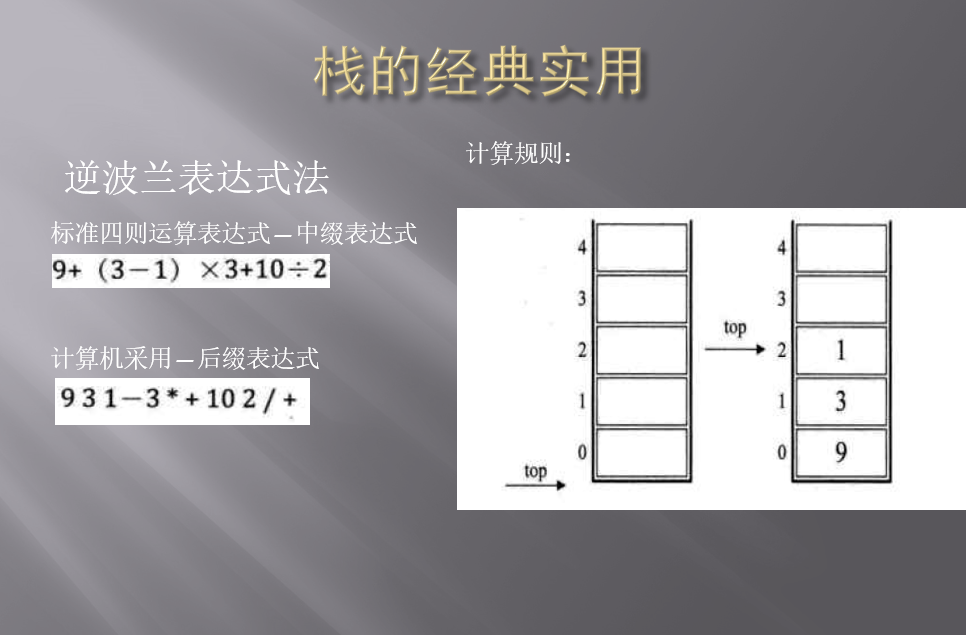
数字输出、运算符进栈、括号匹配出栈、栈顶优先级低出栈
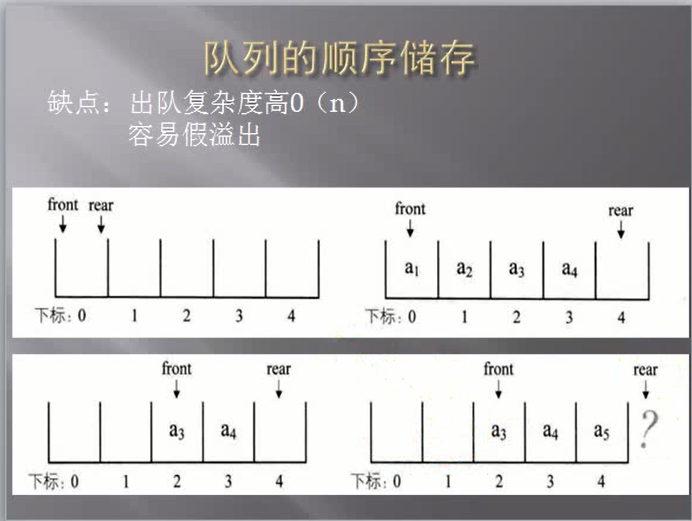
public interface Queue<E> extends Collection<E> { /** * Inserts the specified element into this queue if it is possible to do so * immediately without violating capacity restrictions, returning * {@code true} upon success and throwing an {@code IllegalStateException} * if no space is currently available. * * @param e the element to add * @return {@code true} (as specified by {@link Collection#add}) * @throws IllegalStateException if the element cannot be added at this * time due to capacity restrictions * @throws ClassCastException if the class of the specified element * prevents it from being added to this queue * @throws NullPointerException if the specified element is null and * this queue does not permit null elements * @throws IllegalArgumentException if some property of this element * prevents it from being added to this queue */ boolean add(E e); /** * Inserts the specified element into this queue if it is possible to do * so immediately without violating capacity restrictions. * When using a capacity-restricted queue, this method is generally * preferable to {@link #add}, which can fail to insert an element only * by throwing an exception. * * @param e the element to add * @return {@code true} if the element was added to this queue, else * {@code false} * @throws ClassCastException if the class of the specified element * prevents it from being added to this queue * @throws NullPointerException if the specified element is null and * this queue does not permit null elements * @throws IllegalArgumentException if some property of this element * prevents it from being added to this queue */ boolean offer(E e); /** * Retrieves and removes the head of this queue. This method differs * from {@link #poll poll} only in that it throws an exception if this * queue is empty. * * @return the head of this queue * @throws NoSuchElementException if this queue is empty */ E remove(); /** * Retrieves and removes the head of this queue, * or returns {@code null} if this queue is empty. * * @return the head of this queue, or {@code null} if this queue is empty */ E poll(); /** * Retrieves, but does not remove, the head of this queue. This method * differs from {@link #peek peek} only in that it throws an exception * if this queue is empty. * * @return the head of this queue * @throws NoSuchElementException if this queue is empty */ E element(); /** * Retrieves, but does not remove, the head of this queue, * or returns {@code null} if this queue is empty. * * @return the head of this queue, or {@code null} if this queue is empty */ E peek(); }
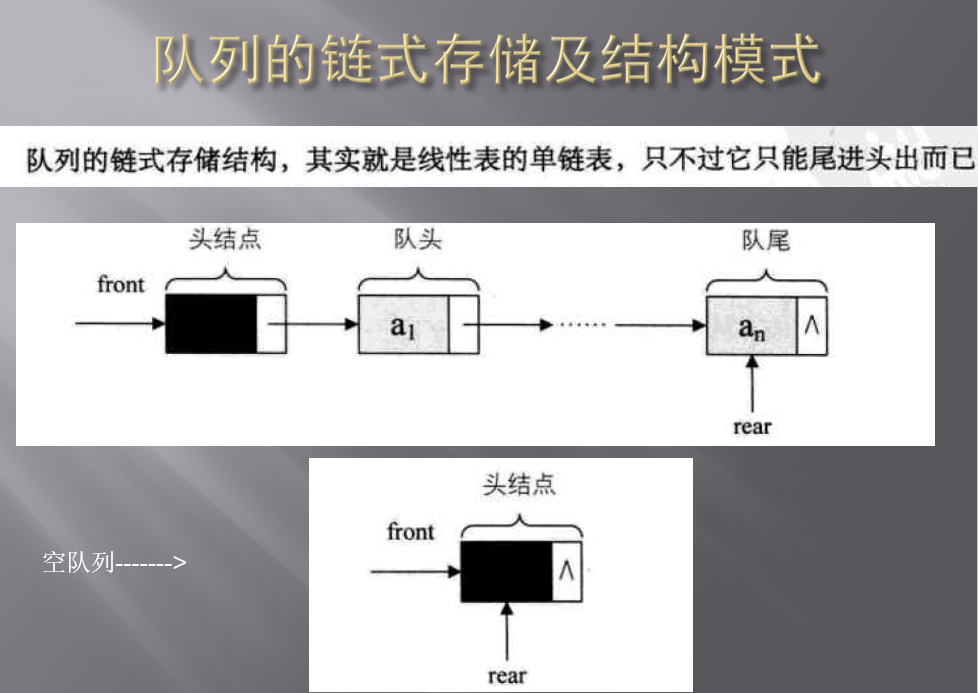
public class LinkedList<E> extends AbstractSequentialList<E> implements List<E>, Deque<E>, Cloneable, java.io.Serializable { transient int size = 0; /** * Pointer to first node. * Invariant: (first == null && last == null) || * (first.prev == null && first.item != null) */ transient Node<E> first; /** * Pointer to last node. * Invariant: (first == null && last == null) || * (last.next == null && last.item != null) */ transient Node<E> last; /** * Constructs an empty list. */ public LinkedList() { } /** * Constructs a list containing the elements of the specified * collection, in the order they are returned by the collection's * iterator. * * @param c the collection whose elements are to be placed into this list * @throws NullPointerException if the specified collection is null */ public LinkedList(Collection<? extends E> c) { this(); addAll(c); } /** * Links e as first element. */ private void linkFirst(E e) { final Node<E> f = first; final Node<E> newNode = new Node<>(null, e, f); first = newNode; if (f == null) last = newNode; else f.prev = newNode; size++; modCount++; } /** * Links e as last element. */ void linkLast(E e) { final Node<E> l = last; final Node<E> newNode = new Node<>(l, e, null); last = newNode; if (l == null) first = newNode; else l.next = newNode; size++; modCount++; } /** * Inserts element e before non-null Node succ. */ void linkBefore(E e, Node<E> succ) { // assert succ != null; final Node<E> pred = succ.prev; final Node<E> newNode = new Node<>(pred, e, succ); succ.prev = newNode; if (pred == null) first = newNode; else pred.next = newNode; size++; modCount++; } /** * Unlinks non-null first node f. */ private E unlinkFirst(Node<E> f) { // assert f == first && f != null; final E element = f.item; final Node<E> next = f.next; f.item = null; f.next = null; // help GC first = next; if (next == null) last = null; else next.prev = null; size--; modCount++; return element; } /** * Unlinks non-null last node l. */ private E unlinkLast(Node<E> l) { // assert l == last && l != null; final E element = l.item; final Node<E> prev = l.prev; l.item = null; l.prev = null; // help GC last = prev; if (prev == null) first = null; else prev.next = null; size--; modCount++; return element; }





【推荐】编程新体验,更懂你的AI,立即体验豆包MarsCode编程助手
【推荐】凌霞软件回馈社区,博客园 & 1Panel & Halo 联合会员上线
【推荐】抖音旗下AI助手豆包,你的智能百科全书,全免费不限次数
【推荐】轻量又高性能的 SSH 工具 IShell:AI 加持,快人一步